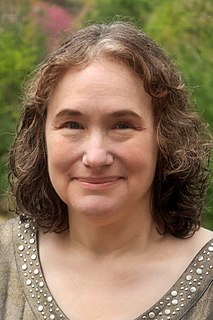A Quote by Hans Christian Andersen
At first she was overjoyed that he would be with her, but then she recalled that human people could not live under the water, and he could only visit her father's palace as a dead man.
Related Quotes
I think that one morning, the Papess woke in her tower, and her blankets were so warm, and the sun was so golden, she could not bear it. I think she woke, and dressed, and washed her face in cold water, and rubbed her shaven head. I think she walked among her sisters, and for the first time saw that they were so beautiful, and she loved them. I think she woke up one morning of all her mornings, and found that her heart was as white as a silkworm, and the sun was clear as glass on her brow, and she believed then that she could live, and hold peace in her hand like a pearl.
I mean, her father was an alcoholic, and her mother was the suffering wife of a man who she could never predict what he would do, where he would be, who he would be. And it's sort of interesting because Eleanor Roosevelt never writes about her mother's agony. She only writes about her father's agony. But her whole life is dedicated to making it better for people in the kind of need and pain and anguish that her mother was in.
And she arose from her deathbed in a gossamer gown, with eyes the color of starlight and hair as black as the night. And those who were her captors trembled, for the scent of death and madness emanated from her soul, and yet she was not dead. She moved like the spiders that creep in the treetops, and none could look away. Taking her first captor in hand, she fed deep and ravenous. And so it was that Myst, Queen of the Indigo Court, was born from the blood of the dead.
She stared at herself in the mirror. Her eyes were dark, almost black, filled with pain. She'd let someone do that to her. She'd known all along she felt things too deeply. She became attached. She didn't want a lover who could walk away from her, because she could never do that - love someone completely and survive intact if her left her.
Sometimes she wished for someone she could tell about her problems, just to be able to say, ‘I’m in love with a man and I can’t have him.’ But that would only lead to questions she couldn’t answer, so she kept the secret and the pain inside, hoping someday she would no longer feel as if half of her were missing.
And she loved a man who was made out of nothing. A few hours without him and right away she’d be missing him with her whole body, sitting in her office surrounded by polyethylene and concrete and thinking of him. And every time she’d boil water for coffee in her ground-floor office, she’d let the steam cover her face, imagining it was him stroking her cheeks, her eyelids and she’d wait for the day to be over, so she could go to her apartment building, climb the flight of stairs, turn the key in the door, and find him waiting for her, naked and still between the sheets of her empty bed.
Perhaps I will die too, she told herself, and the thought did not seem so terrible to her. If she flung herself from the window, she could put an end to her suffering, and in the years to come the singers would write songs of her grief. Her body would lie on the stones below, broken and innocent, shaming all those who had betrayed her. Sansa went so far as to cross the bedchamber and throw open the shutters ... but then her courage left her, and she ran back to her bed, sobbing.
Oh diary, I love her, I love her, I love her so much. Jordana is the most amazing person I have ever met. I could eat her. I could drink her blood. She's the only person I would allow to be shrunk to microscopic size and explore me in a tiny submersible machine. She is wonderful and beautiful and sensitive and funny and sexy. She's too good for me, she's too good for anyone! All I could do was let her know. I said: "I love you more than words. And I am a big fan of words.
Now hoppin'-john was F. Jasmine's very favorite food. She had always warned them to wave a plate of rice and peas before her nose when she was in her coffin, to make certain there was no mistake; for if a breath of life was left in her, she would sit up and eat, but if she smelled the hopping-john, and did not stir, then they could just nail down the coffin and be certain she was truly dead.
She rested her head against his and felt, for the first time, what she would often feel with him: a self-affection. He made her like herself. With him, she was at ease; her skin felt as though it was her right size.. It seemed so natural, to talk to him about odd things. She had never done that before. The trust, so sudden and yet so complete, and the intimacy, frightened her.. But now she could think only of all the things she yet wanted to tell him, wanted to do with him.
She'd assumed she'd be married and have kids by this age, that she would be grooming her own daughter for this, as her friends were doing. She wanted it so much she would dream about it sometimes, and then she would wake up with the skin at her wrists and neck red from the scratchy lace of the wedding gown she'd dreamed of wearing. But she'd never felt anything for the men she'd dated, nothing beyond her own desperation. And her desire to marry wasn't strong enough, would never be strong enough, to allow her to marry a man she didn't love.
Emma dropped the paper. Her first impression was of a weak feeling in her stomach and in her knees; then of blind guilt, of unreality, of coldness, of fear; then she wished that it were already the next day. Immediately afterwards she realized that that wish was futile because the death of her father was the only thing that had happened in the world, and it would go on happening endlessly.


































